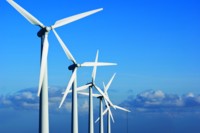First-of-its-kind Global Cleantech Innovation Index Published
 Denmark, Israel, Sweden, Finland and the US provide the best conditions for clean technology start-up creation, with companies in the Asia Pacific region following closely behind when it comes to commercial success, according to a newly released Global Cleantech Innovation Index report.
Denmark, Israel, Sweden, Finland and the US provide the best conditions for clean technology start-up creation, with companies in the Asia Pacific region following closely behind when it comes to commercial success, according to a newly released Global Cleantech Innovation Index report.Canada ranks seventh, according to the report, which it attributes to an entrepreneurial culture, relatively high patent activity and existing corporate activity in the green-tech sector. Canada’s rank is a surprise, according to the report, because the country has “a poor reputation at a federal level for political leadership on climate change.”
In Coming Clean: The Global Cleantech Innovation Index 2012, the Cleantech Group and WWF examined where entrepreneurial cleantech companies are growing today, and which countries are falling above and below the curve for fostering cleantech innovation.
Thirty-eight countries were evaluated on 15 indicators related to the creation and commercialisation of cleantech start-ups, generating an index measuring each one’s potential, relative to their economic size, to produce entrepreneurial cleantech start-up companies and commercialise clean technology innovations over the next 10 years.
The four top scoring countries were Denmark, Israel, Sweden and Finland. These countries all have small economies and while they are the source of much innovation, they have less ability to scale-up companies. These small countries need innovative approaches and collaboration to compensate for the lack of large domestic markets and inconsistent availability of finance throughout a company’s life-cycle.
The study emphasizes the growing importance of clean technology innovations, which it says will be scaling up quickly in the next 10 to 30 years, as the focus shifts from hydrocarbons to renewable energy.
“This index shows that several countries are on the right track, but clearly much more needs to be done if we are to properly address climate change and achieve a transition towards a global 100 percent renewable future,” said Samantha Smith, leader of WWF’s Global Climate and Energy Initiative.
“The overwhelming majority of capital required for making the transition to a low-carbon future will come from a variety of private sources. Developing a working recipe for strengthening the flow of public-private finance towards early as well as later stage cleantech is key for countries that want to taste the economic success of cleantech,” she added.
North America and northern Europe emerged as the primary contributors to the development of innovative cleantech companies.
The US placed fifth in the Index. However in absolute terms, without factoring in economic size, the United States leads in many measures of cleantech innovation: the country has the greatest public cleantech R&D budget, the greatest number of cleantech start-ups and investors, as well as the most venture capital, private equity, and M&A deals in cleantech.
However, the Asia Pacific region performs well when it comes to scaling up entrepreneurial cleantech companies to wider commercial success and revenue creation. While currently seeing fewer emerging cleantech start-ups and placing 13th, China leads in cleantech manufacturing, is strong in early-stage growth, and shows potential to produce more early stage innovation in the future.
The country is rapidly gaining access to funding due to success in raising money for cleantech-focused funds. Additionally, China has been home to the majority of cleantech IPOs since 2009, many of which listed on the recently established ChiNext board of the Shenzhen stock exchange.
You can return to the main Market News page, or press the Back button on your browser.

